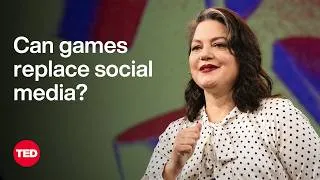请双击下面的英文字幕来播放视频。
翻译人员: Angelia King
校对人员: Vivian Lee
我想让大家看看这个婴儿。
00:16
I want you to take a look at this baby.
0
16284
2683
吸引大家关注的是她的眼睛
00:19
What you're drawn to are her eyes
and the skin you love to touch.
1
19439
4796
以及让人忍不住摸摸的皮肤。
00:24
But today I'm going to talk to you
about something you can't see.
2
24646
3140
但今天我要讲些你看不到的东西,
00:27
What's going on
up in that little brain of hers.
3
27810
2752
在她的小脑袋瓜里的东西。
00:31
The modern tools of neuroscience
are demonstrating to us
4
31395
3921
当代神经科学的研究工具
展示出我们对婴儿脑袋里的东西
00:35
that what's going on up there
is nothing short of rocket science.
5
35340
3895
知之甚少。
00:39
And what we're learning
is going to shed some light
6
39996
3437
我们要知道的
是让浪漫作家和诗人
00:43
on what the romantic writers and poets
described as the "celestial openness"
7
43457
5898
产生灵感
并称之为孩子心智的
00:49
of the child's mind.
8
49379
1857
“非凡的通慧”
大家这儿看到的
00:52
What we see here is a mother in India,
9
52273
3458
是印度的一位母亲,
00:55
and she's speaking Koro,
which is a newly discovered language.
10
55755
3904
她讲克罗语,
这是一种新发现的语言。
她对她的孩子说这种语言。
01:00
And she's talking to her baby.
11
60057
1807
这位母亲
01:02
What this mother --
12
62349
1156
01:03
and the 800 people who speak
Koro in the world --
13
63529
3219
和世界上说克罗语的800人
01:06
understands is that,
to preserve this language,
14
66772
3210
明白要保留这种语言,
他们必须对婴儿说这种语言。
01:10
they need to speak it to the babies.
15
70006
2586
01:12
And therein lies a critical puzzle.
16
72616
2875
在这里有个关键的问题。
01:15
Why is it that you can't
preserve a language
17
75515
2250
为什么要是对你和我,成年人说一种新语言
01:17
by speaking to you and I, to the adults?
18
77789
3235
却不能保留它?
这是和你的大脑有关。
01:21
Well, it's got to do with your brain.
19
81048
2188
01:23
What we see here is that language
has a critical period for learning.
20
83798
4438
这儿我们看到
有个学习语言的关键期。
01:28
The way to read this slide is to look
at your age on the horizontal axis.
21
88260
3800
读懂这幅图的方法是看你在横轴上的年龄。
(笑声)
01:32
(Laughter)
22
92084
2683
01:34
And you'll see on the vertical
your skill at acquiring a second language.
23
94791
3639
你再对应看纵轴上
你悉得第二外语的能力。
婴儿和孩子是语言天才
01:39
The babies and children are geniuses
until they turn seven,
24
99049
3859
直到7岁
01:42
and then there's a systematic decline.
25
102932
2304
然后语言系统会呈下降趋势。
01:45
After puberty, we fall off the map.
26
105260
2497
青春期后,如图我们语言能力衰退。
科学家们确信这曲线图的情况,
01:48
No scientists dispute this curve,
27
108194
2532
01:50
but laboratories all over the world
28
110750
1955
但是全世界的实验室
01:52
are trying to figure out
why it works this way.
29
112729
2507
都试图查明这到底是怎么回事.
01:55
Work in my lab is focused on the first
critical period in development,
30
115778
4034
在我实验室的工作主要是
研究第一个关键期
01:59
and that is the period in which babies
31
119836
1845
这个时期是关于
02:01
try to master which sounds
are used in their language.
32
121705
3365
婴儿试着掌握他们语言中的声音。
我们认为通过研究这些被婴儿学会的声音,
02:05
We think, by studying
how the sounds are learned,
33
125094
2490
02:07
we'll have a model
for the rest of language,
34
127608
2265
我们会给学习其他语言一个模式,
02:09
and perhaps for critical periods
that may exist in childhood
35
129897
2938
或许关键期也出现在孩童期
02:12
for social, emotional
and cognitive development.
36
132859
2863
也为了研究社会,情感
和认知发展。
02:16
So we've been studying the babies
37
136295
1941
我们一直研究婴儿
02:18
using a technique
that we're using all over the world
38
138260
2503
使用的技巧,也是全世界使用的语言技巧
02:20
and the sounds of all languages.
39
140787
1856
和所有语言的声音技巧。
02:22
The baby sits on a parent's lap,
40
142667
1791
婴儿坐在父母的膝上,
02:24
and we train them to turn
their heads when a sound changes --
41
144482
2921
我们训练他们,当听到一个声音
从“ah”到 “ee” 他们就转头。
02:27
like from "ah" to "ee."
42
147427
1458
02:28
If they do so at the appropriate time,
the black box lights up
43
148909
3433
如果他们一听到就转头,
黑盒子就会亮
02:32
and a panda bear pounds a drum.
44
152366
1984
会出现一只敲鼓的熊猫。
02:34
A six-monther adores the task.
45
154374
2418
六个月大的婴儿喜欢这个测试。
我们从中了解到什么呢?
02:37
What have we learned?
46
157420
1161
02:38
Well, babies all over the world
47
158605
2160
全世界的婴儿
02:40
are what I like to describe
as "citizens of the world."
48
160789
3658
就如我所述的
是世界公民;
02:44
They can discriminate
all the sounds of all languages,
49
164906
2928
他们能区分所有语言的所有声音
02:47
no matter what country we're testing
and what language we're using,
50
167858
3232
不管测试在哪一国,用哪种语言。
令人惊讶的是你我却做不到这点。
02:51
and that's remarkable
because you and I can't do that.
51
171114
2995
我们是受制于文化局限的听众。
02:54
We're culture-bound listeners.
52
174133
1971
我们只能区分我们自己语言的声音,
02:56
We can discriminate the sounds
of our own language,
53
176128
2395
但分不清外语的那些声音。
02:58
but not those of foreign languages.
54
178547
1847
所以问题随之产生,
03:00
So the question arises:
When do those citizens of the world
55
180418
3167
这些小小世界公民在什么时候
03:03
turn into the language-bound
listeners that we are?
56
183609
2884
变成受制于文化局限的听众?
03:06
And the answer:
before their first birthdays.
57
186517
3137
答案是:一岁之前
03:09
What you see here is performance
on that head-turn task
58
189678
3132
这里看到的是扭转头测试效果
03:12
for babies tested in Tokyo
and the United States,
59
192834
2463
用来测试日本东京
和美国西雅图的婴儿,
03:15
here in Seattle,
60
195321
1438
03:16
as they listened to "ra" and "la" --
61
196783
1749
让他们听ra和la的发音
03:18
sounds important to English,
but not to Japanese.
62
198556
2806
这两个发音在英文里很重要,在日语里却没有
03:21
So at six to eight months,
the babies are totally equivalent.
63
201386
3378
对于6到8个月的婴儿,他们的测试结果完全相似
03:24
Two months later,
something incredible occurs.
64
204788
2554
2个月之后便产生明显变化
03:27
The babies in the United States
are getting a lot better,
65
207366
2680
在美国的婴儿掌握这些发音比较好,
在日本的婴儿却差很多
03:30
babies in Japan are getting a lot worse,
66
210070
1924
但是这两组的婴儿
03:32
but both of those groups of babies
are preparing for exactly the language
67
212018
3450
均蓄势待发地要学习语言。
03:35
that they are going to learn.
68
215492
1492
问题在于,在这个2个月的关键期
03:37
So the question is: What's happening
during this critical two-month period?
69
217008
4624
发生了什么?
03:41
This is the critical period
for sound development,
70
221656
2343
在声音开发的这关键期
到底发生什么了?
03:44
but what's going on up there?
71
224023
1415
03:45
So there are two things going on.
72
225462
1979
主要是两件事。
03:47
The first is that the babies
are listening intently to us,
73
227465
2876
第一婴儿不断地专心听我们说话,
03:50
and they're taking statistics
as they listen to us talk --
74
230365
3733
并且做统计
他们统计这些声音。
03:54
they're taking statistics.
75
234122
1981
听听2位母亲说的亲情用语
03:56
So listen to two mothers
speaking motherese --
76
236127
2539
03:58
the universal language
we use when we talk to kids --
77
238690
3042
这是我们对孩子说的通用语言妈妈语
04:01
first in English and then in Japanese.
78
241756
2211
首先是英语,然后是日语。
04:03
(Video) Ah, I love your big blue eyes --
79
243991
3439
(视频)说英语的妈妈:啊,我多爱你大大的蓝眼睛
04:07
so pretty and nice.
80
247454
2806
这么漂亮,这么好看。
04:11
(Japanese)
81
251309
5927
说日语的妈妈:[日语]
04:17
Patricia Kuhl: During the production
of speech, when babies listen,
82
257712
3367
帕特里夏·库尔:在语言生成的期间,
当婴儿聆听时,
04:21
what they're doing is taking statistics
on the language that they hear.
83
261103
4769
他们同时也在统计
他们听到的语言。
04:26
And those distributions grow.
84
266613
2910
区分这些声音的能力在变强。
04:29
And what we've learned is that babies
are sensitive to the statistics,
85
269547
4373
我们了解到的
是婴儿对统计很敏感,
04:33
and the statistics of Japanese
and English are very, very different.
86
273944
3828
日语和英语的声音统计是非常,非常不同的。
04:37
English has a lot of Rs and Ls.
87
277796
2657
英语有很多R和L音
04:40
The distribution shows.
88
280477
1759
如分布图所示
04:42
And the distribution of Japanese
is totally different,
89
282260
2840
日语的分布图则是完全不同的
我们在这儿看到一组中间音,
04:45
where we see a group
of intermediate sounds,
90
285124
3001
它们是日语的R音。
04:48
which is known as the Japanese "R."
91
288149
2415
04:50
So babies absorb
the statistics of the language
92
290588
4108
婴儿吸收
语言的统计数据
04:54
and it changes their brains;
93
294720
1678
这改变了他们的大脑;
04:56
it changes them
from the citizens of the world
94
296422
2151
这就是把他们从世界公民
04:58
to the culture-bound
listeners that we are.
95
298597
2946
变成像我们一样受文化局限的听众。
05:01
But we as adults are no longer
absorbing those statistics.
96
301567
4713
但我们成年人
不再吸收这些统计。
我们受我们早期形成的
05:06
We are governed
by the representations in memory
97
306304
2557
05:08
that were formed early in development.
98
308885
2549
记忆性语言的影响。
05:11
So what we're seeing here
99
311458
1778
所以我们在这儿看到的
05:13
is changing our models
of what the critical period is about.
100
313260
3233
关键期是如何改变我们的语言模式。
05:16
We're arguing from
a mathematical standpoint
101
316517
2769
我们从数学角度争论
05:19
that the learning of language
material may slow down
102
319310
3140
学习语言材料的能力会放慢下来
05:22
when our distributions stabilize.
103
322474
2380
当我们语言分布的能力趋于稳定时。
05:24
It's raising lots of questions
about bilingual people.
104
324878
2862
这也引出很多关于双语者的问题。
双语者在脑中同时必须记住2组统计
05:28
Bilinguals must keep two sets
of statistics in mind at once
105
328178
4031
并能任意切换
05:32
and flip between them,
one after the other,
106
332233
2883
决定于他们与谁交流
05:35
depending on who they're speaking to.
107
335140
1772
05:36
So we asked ourselves,
108
336936
1154
那么我们自问,
05:38
can the babies take statistics
on a brand new language?
109
338114
3407
婴儿能不能统计一种全新的语言?
05:41
And we tested this
by exposing American babies
110
341545
3278
我们测试了这个,通过给美国婴儿
听他们从没听过的第二种语言
05:44
who'd never heard a second language
111
344847
1689
这是在关键期时他们第一次听到普通话。
05:46
to Mandarin for the first time
during the critical period.
112
346560
2716
我们得知,当我们让台北和西雅图的单语者
05:49
We knew that, when monolinguals
were tested in Taipei and Seattle
113
349300
3537
接触普通话声音,
05:52
on the Mandarin sounds,
they showed the same pattern.
114
352861
2662
他们显示同样的模式。
05:55
Six to eight months,
they're totally equivalent.
115
355547
2471
在6到8个月大时他们辨音能力几乎相同
2个月之后,一些不可思议的事情发生了。
05:58
Two months later,
something incredible happens.
116
358042
2536
06:00
But the Taiwanese babies are getting
better, not the American babies.
117
360602
3552
但这次台湾婴儿表现好,而不是美国的婴儿。
我们所做的是在这关键期让美国的婴儿
06:04
What we did was expose American babies,
during this period, to Mandarin.
118
364178
4882
多接触普通话。
这就好像说普通话的亲戚来拜访了一个月
06:09
It was like having Mandarin relatives
come and visit for a month
119
369084
3008
住到你家
06:12
and move into your house
and talk to the babies for 12 sessions.
120
372116
3797
和婴儿上了12节普通话课。
06:15
Here's what it looked like
in the laboratory.
121
375937
2206
在实验室它看起来就像这样。
(视频)普通话说者:[普通话]
06:18
(Mandarin)
122
378167
5556
06:39
PK: So what have we done
to their little brains?
123
399922
2246
所以我们对他们的小脑袋瓜都做了什么?
(笑声)
06:42
(Laughter)
124
402192
2044
06:44
We had to run a control group to make sure
125
404260
2671
我们还得有一个对照组
06:46
that coming into the laboratory
didn't improve your Mandarin skills.
126
406955
3212
确保来到实验室
并不能提高普通话的水平。
06:50
So a group of babies came in
and listened to English.
127
410191
2653
所以这组婴儿来这儿只听英语。
06:52
And we can see from the graph
128
412868
1402
我们从这图表看出
06:54
that exposure to English
didn't improve their Mandarin.
129
414294
2583
在英语条件下的婴儿没有提高他们的汉语。
06:56
But look at what happened to the babies
exposed to Mandarin for 12 sessions.
130
416901
3595
但看看上过12次普通话课的婴儿的身上
都发生了什么。
07:00
They were as good as the babies in Taiwan
131
420520
2400
他们和那些曾听普通话有
07:02
who'd been listening
for 10 and a half months.
132
422944
2976
10个半月大的台湾婴儿一样棒。
07:05
What it demonstrated is that babies
take statistics on a new language.
133
425944
3824
这说明了
婴儿对一种新语言也能做统计。
07:09
Whatever you put in front of them,
they'll take statistics on.
134
429792
3444
不管你在他们面前说了什么,他们就会统计这语言。
07:13
But we wondered what role
135
433260
1590
我们也好奇
07:14
the human being played
in this learning exercise.
136
434874
4237
在这一学习过程中
人起了什么样的作用。
07:19
So we ran another group of babies
in which the kids got the same dosage,
137
439428
4316
所以我们设置了另一组婴儿
让他们如法炮制地上12节课,
07:23
the same 12 sessions,
but over a television set.
138
443768
2468
但是在电视机前上课
07:26
And another group of babies
who had just audio exposure
139
446260
3661
和另一组婴儿只是通过音频上课
07:29
and looked at a teddy bear on the screen.
140
449945
2088
看电视屏幕上的玩具熊。
我们又对他们的脑袋瓜做什么了?
07:32
What did we do to their brains?
141
452057
2179
07:34
What you see here is the audio result --
142
454260
3375
我们这儿看到的是音频结果
没有任何学习效果
07:38
no learning whatsoever --
143
458183
1738
07:39
and the video result --
144
459945
1758
视频结果
07:42
no learning whatsoever.
145
462496
1845
也是没有任何学习效果。
07:44
It takes a human being
for babies to take their statistics.
146
464365
4141
只有人才能
帮助婴儿统计他们的声音数据。
07:48
The social brain is controlling
147
468882
2166
当婴儿在统计时
社会大脑在控制着。
07:51
when the babies
are taking their statistics.
148
471072
2105
我们想了解大脑内部
07:53
We want to get inside the brain
and see this thing happening
149
473201
3493
观察各种变化
07:56
as babies are in front of televisions,
as opposed to in front of human beings.
150
476718
3938
探究电视前的婴儿
和与人在一起的婴儿有何不同
08:00
Thankfully, we have a new machine,
magnetoencephalography,
151
480680
4697
多亏我们有了这台新机器,
脑磁图显示机,
它可以让我们做到这个。
08:05
that allows us to do this.
152
485401
1293
08:06
It looks like a hair dryer from Mars.
153
486718
2585
它看上去就像来自火星的吹风机。
但它是完全安全的,
08:09
But it's completely safe,
completely noninvasive and silent.
154
489327
4483
完全对人无害,而且是静音的。
08:13
We're looking at millimeter accuracy
155
493834
2443
我们的要求是
在空间上精确到毫米
08:16
with regard to spatial
and millisecond accuracy
156
496301
3316
时间上精确到毫秒
08:19
using 306 SQUIDs --
157
499641
2622
使用306 SQUIDs
即是超导
08:22
these are superconducting
quantum interference devices --
158
502287
3100
量子干涉磁量仪
08:25
to pick up the magnetic fields
that change as we do our thinking.
159
505411
3631
用来检测
我们大脑变化的磁场。
08:29
We're the first in the world
to record babies in an MEG machine
160
509509
5609
我们是世界上第一个
记录婴儿
在脑磁图显示机下的
08:35
while they are learning.
161
515142
2391
学习的脑图。
08:37
So this is little Emma.
162
517557
1679
所以这是小爱玛
08:39
She's a six-monther.
163
519260
1908
她有6个月大。
08:41
And she's listening to various languages
in the earphones that are in her ears.
164
521192
5118
她正通过耳机
聆听多种语言
08:46
You can see, she can move around.
165
526334
2224
大家可以看到,她可以移动。
08:48
We're tracking her head
with little pellets in a cap,
166
528582
3770
我们用她帽子上的小球
来记录她的脑图
08:52
so she's free to move
completely unconstrained.
167
532376
2975
所以她完全不受束缚地自由地移动。
08:55
It's a technical tour de force.
168
535375
2213
这是一个技术上的杰作。
08:57
What are we seeing?
169
537612
1584
我看到什么了?
08:59
We're seeing the baby brain.
170
539220
1894
我们看到婴儿的大脑。
09:01
As the baby hears a word in her language,
the auditory areas light up,
171
541138
5286
当婴儿听到语言中的一个词
大脑中听觉区域亮起来,
09:06
and then subsequently areas surrounding it
that we think are related to coherence,
172
546448
4788
然后在它周围的其它区域也亮起来
我们认为这是有关联贯性的
09:11
getting the brain coordinated
with its different areas, and causality,
173
551260
3976
让大脑和其他不同脑区域相协调,
一前一后,
09:15
one brain area
causing another to activate.
174
555260
2976
一片脑区域激活另一片脑区域。
09:18
We are embarking on a grand
and golden age of knowledge
175
558861
5384
我们开启了
一个开发儿童大脑知识的
宏伟的黄金年代。
09:24
about child's brain development.
176
564269
2236
09:26
We're going to be able
to see a child's brain
177
566529
2421
我们能够观察他们的大脑
09:28
as they experience an emotion,
as they learn to speak and read,
178
568974
4241
当儿童体验到感情,
学着说和读,
解决一个数学问题,
09:33
as they solve a math problem,
as they have an idea.
179
573239
3202
或当他们有个想法的时候
09:36
And we're going to be able to invent
brain-based interventions
180
576775
3349
我们也能为学习有障碍的孩童
发明基于脑的治疗方法。
09:40
for children who have difficulty learning.
181
580148
2270
09:42
Just as the poets and writers described,
182
582831
3066
正如诗人和作家所描述的,
09:45
we're going to be able to see, I think,
that wondrous openness,
183
585921
4154
我想我们能够看到
一种奇妙的融通开放,
一个孩子心智的
09:50
utter and complete openness,
of the mind of a child.
184
590099
3424
完全开放
09:54
In investigating the child's brain,
185
594284
2676
在对儿童大脑的研究中,
09:56
we're going to uncover deep truths
about what it means to be human,
186
596984
3996
我们会深刻揭示
这对人类来说意味着什么的事实,
在这一过程中,
10:01
and in the process,
187
601004
1155
10:02
we may be able to help keep
our own minds open to learning
188
602183
3071
我们或许能帮助我们自身开放心智
在我们一生中不断地学习。
10:05
for our entire lives.
189
605278
1691
10:06
Thank you.
190
606993
1243
谢谢。
10:08
(Applause)
191
608260
3000
(掌声)
New videos
关于本网站
这个网站将向你介绍对学习英语有用的YouTube视频。你将看到来自世界各地的一流教师教授的英语课程。双击每个视频页面上显示的英文字幕,即可从那里播放视频。字幕会随着视频的播放而同步滚动。如果你有任何意见或要求,请使用此联系表与我们联系。







